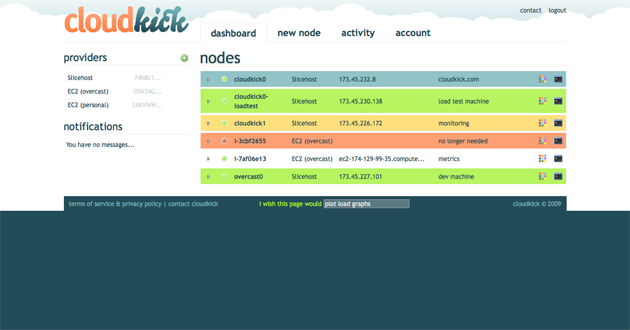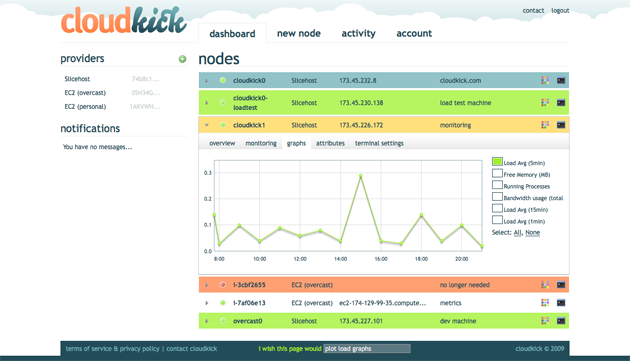
Cloudkick, a Y Combinator startup, offers a free, easy server management system to businesses whose web infrastructure is maintained by Amazon’s EC2 or Slicehost cloud-based servers. Built off of Amazon Web Services’ API, Cloudkick gives users a single control panel where you can manage all of your servers (or instances) through various platforms.
Cloudkick’s dashboard allows you to easily add or remove EC2 or Slicehost servers with a click and then monitor an unlimited amount of instances. You can see all the servers in one place, and color-code and label each server. Cloudkick will check whether servers are alive and functioning and then alert you, via email or voicemail, if servers go down. Cloudkick also provides data on bandwith and other metrics on servers in easy to use graphs and tables, allowing you a visual snapshot of server activity. You can also access servers straight from web and can run commands through your web browser remotely, which is handy when you are trying to manage servers from another computer.
So far, Cloudkick’s virtual control center is integrated with Amazon and Slicehost only but plans to add more cloud computing platforms in the future. Currently, the startup is managing about 350 servers of 40 Y Combinator startups.
Amazon offers a web-console along with their product but you cannot add servers from other cloud platform, you can’t tag or label servers, you can’t run commands on servers from the web and EC2 doesn’t offer graphing or monitoring features. There are other cloud management services out there, like Rightscale, that offer similar services to Cloudkick. In fact, Rightscale offers a few more features in a easy to see dashboard, but the kicker is that Cloudkick is free. Rightscale’s plans run into the thousands.
Cloudkick is part of the dawn of cross-cloud applications and management tools. The application seems like a useful tool for businesses looking for an easy-to-use dashboard to control cloud-based servers. And it helps that its free. As technology companies roll out their cloud platforms, like Microsoft will be doing soon with its platform, Azure, and businesses begin to become increasingly reliant on the cloud, these management tools will become even more useful. And Cloudkick could gain good traction in this space if they integrate their application with more than just two types of platforms.

